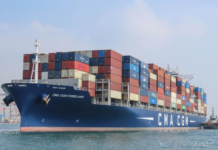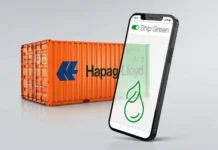
Reefer cargo to Middle Eastern destinations has seen a “negative spiral”, as a direct result of the Cape of Good Hope diversions with carriers taking a more direct route from Europe to the Far East.
A Xeneta analysis of two reefer trades from Europe to the Arabian Gulf and Southeast Asian destinations highlights the effects on both trades, as a result of the conflict in Gaza, which has seen Yemen’s Houthi Movement effectively close the Red Sea and Suez Canal route to ocean trade.
Red Sea diversions have accounted for 90% of the vessel transits in the region, but for container shipping, this has meant turning south after Sumatra and returning vessels to the lucrative Asian export market as rapidly as possible via the same route, by-passing the Arabian market.
In the period since the cape diversions have been in place, there has been a significant growth in Southeast Asian freight of 6.8% with demand growth in the Middle East slowing substantially to just 2.5%, as shipping lines divert vessels far to the south on the Indian Ocean leg of the Asia to Europe trades, in both directions.
On 1 January this year reefer rates to Middle Eastern and Southeast Asian markets were just US$64/FEU apart, for a high cube box: “By 19 September, the spread between these trades had increased to an eyebrow-raising $959/feu high cube,” said Xeneta.
According to Xeneta data, rates to the Persian Gulf and the Gulf of Oman surged by around US$1,000/FEU in January this year, from US$2,225/FEU and have now settled at US$3,500/FEU. A similar surge in Southeast Asian reefer rates was also seen, but Xeneta chief analyst Peter Sand pointed out this had now settled at around US$2,500/FEU, an increase of about US$1,000/box on late 2023 prices.
Sand, however, pointed out that, although the Arabian Gulf reefer market is profitable, it is not a significant market in terms of volumes, with just 18,000 TEUs shipped last year, up from 13,000 TEUs. “It’s not a massive change,” he noted.
Although carriers could well be looking for areas in which to make a profit, as the major trades soften it is unlikely that any of the glut of newbuildings will be diverted to such a minor trade.
“Carriers will be looking for different ways to bring in reefer cargo such as transhipping freight at Jeddah or trucking cargo from Jeddah across the Saudi Arabian desert could be another option,” said Sand.
He added: “Trucking is not a substitute for shipping, but if you connect the dots to a broken supply chain and the price is right it could be a route to get freight to market.”
There has been some increase in reefer trades from the Far East and India to Middle Eastern markets, but Sand said this is not competing products and it is not clear that this will replace the products from Europe.
If that proves to be the case, then European products could return to the Middle East as soon as the Suez Canal corridor re-opens.
However, Sand believes that unless there is a turnaround in freight rates within the next year, during which there is a huge number of new vessels expected to be delivered, there is a probability that “carriers will deploy tonnage in a smarter way,” without detailing what that might mean.
Mary Anne Evans
Correspondent at Large





